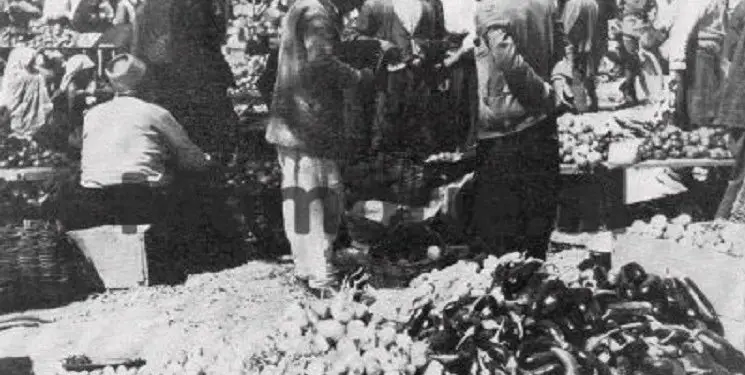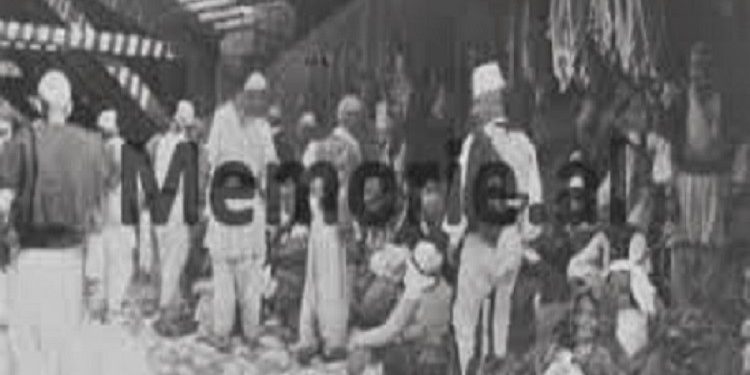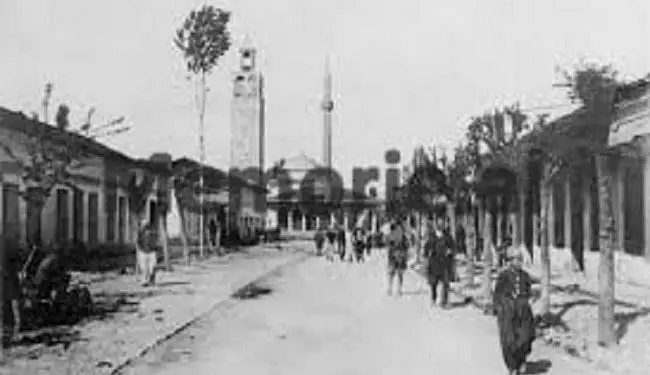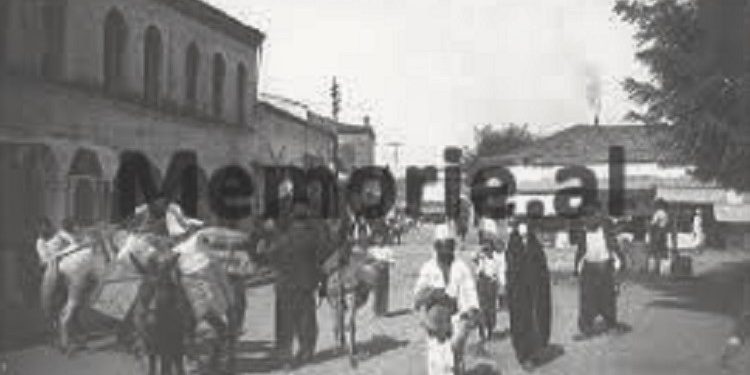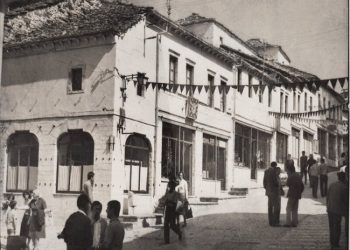Memorie.al/ publishes the unknown story of wheat traders and flour producers in the years of the Zog Monarchy, who, wanting to earn and get rich as soon as possible, abused prices, raising them in a fictitious way. What was the opinion of the economists of that time about these problems, and what measures did they suggest to the government, in order for it to stop the hand of the speculators …?! The whole story of the problem of rising bread prices at that time found a great coverage even by the press of the time, which called on the government to take measures to stabilize the situation and stop the hand of speculators who abused at the expense of the people. One of those press bodies that dealt extensively with that problem, was the newspaper “Besa” of Tirana, from which we have selected this article that it published in several issues in 1933.
Besa newspaper of 1933: Speculation of the grain trade
Our correspondent in Korça, as we published it yesterday in the chronicles section, informed us of the complaints of the people of that city about the behavior of the flour factory, which, pointing out due to the increase in the price of wheat, has caused the price of bread to rise. made the price of flour. We are hearing such complaints not only from Korça, but from all other cities in the country, which are under the direct influence of flour mills. The system used in Korça, for wheat speculation, is applied, point by point in all other cities without any change. This gives us insight that all the flour mills have agreed among themselves and, forming a trust, determine the value of the grain and flour as they please. In no country in the world has the wheat trade been left free. But this right, which in other countries governments have reserved for themselves and which they exercise through government banks, here in our country they have tried to seize the flour mills, which can provide profits, without not the slightest control, to the detriment of the farmer and all consumers.
Flour mill trust tactics
The tactic followed by the flour mills trust is quite clear: in the time of the fields, when the farmer needs to sell his product, they buy the wheat at the price they set themselves and, after filling their warehouses, find a pretext and cause a fictitious estimate on the grain plate to benefit only flour mills. These factories, as they have remained free to this day in their operations, are not only satisfied with the profits they make from the milling (grinding) of wheat, but also speculate on the grain trade. In other words; they are not only flour mills, but also strong, united companies, which carry out the grain trade. Their tactics have been repeated regularly for several years, and no one has been able to impose a more correct behavior on them; the fate of the farmer, the value of bread, and the general interest have remained at the mercy of the flour mills. A few months ago, when flour manufacturers needed to fill their warehouses with wheat, the value of wheat was set at five or six quintals. Now that they are interested in raising the price of wheat, they buy a few quintals, for eight or nine francs, just enough to alarm the plate (grain exchange), and enough to cause a fictitious value. Although this toy is quite banal and ridiculous, yet they can speculate and sell their flours for the value they desire.
Government commission for raising the price of wheat
Why did the price of wheat rise right now that it went from the farmer’s hand to the factory warehouse? What exports, in large quantities, were made to appear on our stock exchange a rise in the price of wheat. Thing of things. All ups and downs on the grain exchange are freely regulated and assigned by the flour mills according to their interest. We, instead of complaining about this flagrant speculation, continue to protect and support these factories by not allowing the opening of these other factories. The behavior of these factories has not failed to reprimand the Government, which a couple of months ago formed a special commission to study this issue. This commission has the duty to report the measures to be taken to cut the rush of all speculations made at the expense of the farmer and the consumer people. The commission has not yet completed its mission, but we have no hope that this commission will be able to bring to light a completed work. The commission at first summoned here all the flour-makers and some traders; wanted to reach an agreement with them on finding a way for the wheat and flour trade to be exercised under the control of the Government. The manufacturers and traders, with their claims and the obstructions they showed, rebelled against the desire expressed by the commission. It remained, therefore, the task of the commission but to make some regulation to mark how the Municipalities should act to set the price of bread. We do not believe that this was the Government’s intention to form such an important commission. The main goal is to stop speculation in the grain trade; the price of bread protected by factory floor cannot change according to the value that the wheat will have each week, but according to the value that the wheat had at the time it was stored in the factory warehouses. In other words, ways must be found so that the factory does not do both the grain trade and the flour trade. Factories should be allowed a profit only as much as they should earn from grinding wheat flour, and nothing else.
Failure of the commission work!
As we see that the special commission could not accomplish anything on the issue of the grain trade, its work which will be limited to the way the price of bread is set, does not at all have the importance that it was hoped to have in the beginning of the formation of this commission. The government could very well use the flour mills as institutes to keep the value of the wheat to such an extent that it liked it, but this, as it would no longer allow the speculation of the wheat, was rejected by the manufacturers of the flour and the fate of the farmer and the consumer rests again at the mercy of this trust. In tomorrow’s issue we will show what can be done in case the government insists on stopping the speculation made by the flour mills today. As we pointed out a little above in this article, we are the only country in the world that has left the mining trade completely free. With the exception of the ban on the import of cereals, we have done nothing to ensure that agricultural products have a mandatory value, as all governments around the world are doing. In addition, with a strange apathy we are watching and speculating that flour mills do in the grain trade. Undoubtedly this is the biggest mistake we are making towards the general economy of our country.
Why should the government insist on prices?
The government, if it insisted, could very well regulate the grain trade through flour mills by exchanging these in a privileged society with certain rights. These mills instead of being left as they are today to speculate to the detriment of the farmer and the consumer, can play the role of a pre-government institute to maintain the balance of the value of wheat. The government can do this by forcing flour mills to buy wheat at a price set by the Ministry of National Economy; factory flour, being divided into several qualities, will be sold on the basis of the value of the grain, and the owners of the ovens will be obliged to use no other flour than that of the factories. This year, for example, if flour mills were available to the government, wheat could be priced at ten quintals. This fictitious value would weigh down factory flour and bread. The consumer, instead of eating bread; twelve or fourteen many per kilogram, he would eat, according to the proportion that would belong to the quality, sixteen or eighteen many per kilogram. The damage that the consumer would see from the fictitious value of the grain, with which he would go straight, for the benefit of the farmer, would be a profit from the general economic point of view. All the people would contribute to the support of the farmer and agriculture. In many parts of the world, the value of bread is determined not by the fear that the bakers will sell it more expensively, but to force them not to sell it cheaply. Such an agreement, between the Government and the flour manufacturers, does not harm today’s factories at all, on the contrary, by recognizing them a monopoly right to grind flour, they could benefit in the proportion set by the Ministry of National Economy. and will take the form of a concessionary company with many rights. This company can be assisted by the Government for the export of wheat or, if necessary, only this company can be allowed to import wheat and corn. Okay yes. Flour makers, accustomed to speculating in the grain trade and making illegal profits to the detriment of producers and consumers, will naturally not want to come under government control and would prefer to continue their trade as have acted to date. Here is the place to point out that today no trade, especially the trade of wheat and flour, is allowed to be practiced freely. The time of free trade has passed for years, People can gladly eat expensive bread, when they know that in this way it contributes to the benefit of the farmer, but cannot bear to eat expensive just to enrich the manufacturers and factories of flour.
Government to launch investigations into abusers
The government should investigate and take this issue seriously. If he finds that the flour mills are nothing but some parasites that feed on the blood of the farmer and when he sees that these mills do not want to come to any agreement with him, he would do very well, in our opinion, to he bought large flour mills from the owners, and directed them to government officials. These factories, all together, can not capture a sum so large as to put the Government in a tight spot, but even if they cost a lot, the government can set the payment in a way that does not burden it. Private interest must be sacrificed for the common good. This proposal of ours should not be considered bold at all, if we remember the law of agrarian reform. The government, in order to free the farmer from a centuries-old slavery, violated, with the law of agrarian reform, all the rights that the big landowners had over the lands they legally enjoyed. So, when the government for the common good, sacrificed the interest of thousands of owners, there is no reason to withdraw from the purchase of four or five factories that exist today in Albania. After the Government has to become the mistress of these factories and after the flour trade declares its own, the company with big capitals will be formed at once to come to an agreement with the Government and today’s factories according to the value and condition that will be determined by the government itself. . The commission set up specifically to study the issue of the wheat and flour trade, instead of spending time preparing a project on how to determine the value of bread, would do much better to study the measures to be taken for stopping the speculation that flour mills are doing today. A commission composed of almost all heads of ministries, should think of radical measures and reforms of importance in accordance with the current situation and based on the principles that are accepted throughout the civilized world. We are sorry for a commission so important to deal with the regulation of forks, which anyone could do and quite easily by translating a foreign regulation. The recent behavior of the flour mills should remind the commission of the importance of its mission and should convince it to have issues to study it more deeply and take more care of than it does today./Memorie.al




